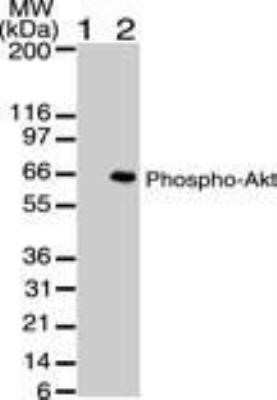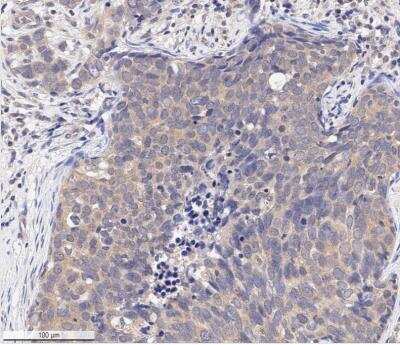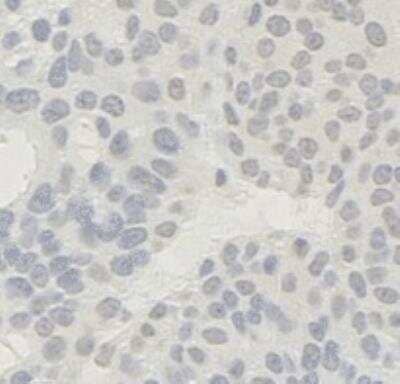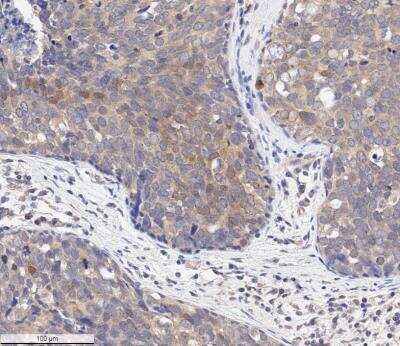AKT1 [p Ser473] Antibody (104A282) - BSA Free
Novus Biologicals, part of Bio-Techne | Catalog # NB100-56749

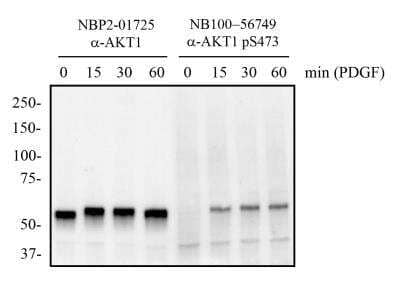
Conjugate
Catalog #
Forumulation
Catalog #
Key Product Details
Validated by
Independent Antibodies, Biological Validation
Species Reactivity
Validated:
Human, Mouse, Rat, Rabbit
Cited:
Human, Mouse, Rat, Rabbit
Predicted:
Amphibian (100%), Chicken (100%), Zebrafish (100%). Backed by our 100% Guarantee.
Applications
Validated:
Immunohistochemistry, Immunohistochemistry-Frozen, Immunohistochemistry-Paraffin, Western Blot
Cited:
Immunohistochemistry-Paraffin, Western Blot
Label
Unconjugated
Antibody Source
Monoclonal Mouse IgG1 kappa Clone # 104A282
Format
BSA Free
Concentration
1 mg/ml
Product Specifications
Immunogen
This AKT1 phospho Ser473 antibody was raised against a synthetic peptide containing phosphorylated serines at amino acid residues 473 of human AKT1.
Reactivity Notes
Rat reactivity reported in scientific literature (PMID: 31092832). Rabbit reactivity reported in scientific literature (PMID: 32936958)
Modification
p Ser473
Specificity
Clone 104A282 detects specifically the Ser473 phosphorylated form of AKT1.
Clonality
Monoclonal
Host
Mouse
Isotype
IgG1 kappa
Theoretical MW
55.7 kDa.
Disclaimer note: The observed molecular weight of the protein may vary from the listed predicted molecular weight due to post translational modifications, post translation cleavages, relative charges, and other experimental factors.
Disclaimer note: The observed molecular weight of the protein may vary from the listed predicted molecular weight due to post translational modifications, post translation cleavages, relative charges, and other experimental factors.
Scientific Data Images for AKT1 [p Ser473] Antibody (104A282) - BSA Free
Western Blot: AKT1 [p Ser473] Antibody (104A282) [NB100-56749] - Total protein from mouse 3T3 cells treated with and without PDGF (50 ng/mL) for the indicated times was separated on a 7.5% gel by SDS-PAGE, transferred to PVDF membrane and blocked in 5% non-fat milk in TBST. The membrane was probed with 2.0 ug/mL anti-AKT1 (NBP2-01725) and 2 ug/mL pS473 AKT1 in 1% BSA in TBST and detected with an anti-mouse HRP secondary antibody using chemiluminescence. Note the detection of phosphorylated AKT1 in response to PDGF treatment compared to total AKT1 protein.
Western Blot: AKT1 [p Ser473] Antibody (104A282) [NB100-56749] - WB of phospho AKT using phospho AKT antibody at 2 ug/mL against untreated (lane 1) and PDGF treated (lane 2) NIH-3T3 lysate. HRP conjugated secondary antibody and ECL substrate solution were used for this test. Image using the Azide and BSA Free form of this antibody.
Immunohistochemistry-Paraffin: AKT1 [p Ser473] Antibody (104A282) [NB100-56749] - IHC analysis of an FFPE human breast carcinoma tissue section using 1:250 dilution of phospho Ser473 AKT1 antibody (clone 104A282) on a Bond Rx autostainer (Leica Biosystems). The assay involved 20 minutes of heat induced antigen retrieval (HIER) with 10 mM sodium citrate buffer (pH 6.0) and endogenous peroxidase quenching using peroxide block. The sections were incubated with primary antibody for 30 minutes. Bond Polymer Refine Detection (Leica Biosystems) and DAB were used for signal detection which followed counterstaining with hematoxylin. Whole slide scanning and capturing of representative images (20X) were performed using Aperio AT2 (Leica Biosystems). This antibody generated a diffused cytoplasmic staining of phosphor-AKT (Ser-473) in the cancer cells as well as the stromal cells. Staining was performed by Histowiz.
Applications for AKT1 [p Ser473] Antibody (104A282) - BSA Free
Application
Recommended Usage
Immunohistochemistry
1:200 - 1:250
Immunohistochemistry-Frozen
reported by customer review
Immunohistochemistry-Paraffin
1:200 - 1:250
Reviewed Applications
Read 2 reviews rated 5 using NB100-56749 in the following applications:
Formulation, Preparation, and Storage
Purification
Protein G purified
Formulation
PBS
Format
BSA Free
Preservative
0.05% Sodium Azide
Concentration
1 mg/ml
Shipping
The product is shipped with polar packs. Upon receipt, store it immediately at the temperature recommended below.
Stability & Storage
Store at 4C short term. Aliquot and store at -20C long term. Avoid freeze-thaw cycles.
Background: Akt1
The main function of AKT is to control inhibition of apoptosis and promote cell proliferation. Survival factors can activate AKT Ser473 and Thr308 phosphorylation sites in a transcription-independent manner, resulting in the inactivation of apoptotic signaling transduction through the tumor suppressor PTEN, an antagonist to PI3-K (5). PTEN exerts enzymatic activity as a phosphatidylinositol-3,4,5-trisphosphate (PIP3) phosphatase, opposing PI3K activity by decreasing availability of PIP3 to proliferating cells, leading to overexpression and inappropriate activation of AKT noted in many types of cancer.
AKT1 function has been linked to overall physiological growth and function (2). AKT1 has been correlated with proteus syndrome, a rare disorder characterized by overgrowth of various tissues caused by a mosaic variant in the AKT1 gene in humans.
AKT2 is strongly correlated with Type II diabetes, including phenotypes of insulin resistance, hyperglycemia and atherosclerosis (2, 6).
The function of AKT3 is specifically associated to brain development, where disruptions to AKT3 are correlated with microcephaly, hemimegalencephaly, megalencephaly and intellectual disabilities (2).
References
1. Ersahin, T., Tuncbag, N., & Cetin-Atalay, R. (2015). The PI3K/AKT/mTOR interactive pathway. Mol Biosyst, 11(7), 1946-1954. doi:10.1039/c5mb00101c
2. Cohen, M. M., Jr. (2013). The AKT genes and their roles in various disorders. Am J Med Genet A, 161a(12), 2931-2937. doi:10.1002/ajmg.a.36101
3. Georgescu, M. M. (2010). PTEN Tumor Suppressor Network in PI3K-Akt Pathway Control. Genes Cancer, 1(12), 1170-1177. doi:10.1177/1947601911407325
4. Mishra, P., Paital, B., Jena, S., Swain, S. S., Kumar, S., Yadav, M. K., . . . Samanta, L. (2019). Possible activation of NRF2 by Vitamin E/Curcumin against altered thyroid hormone induced oxidative stress via NFkB/AKT/mTOR/KEAP1 signalling in rat heart. Sci Rep, 9(1), 7408. doi:10.1038/s41598-019-43320-5
5. Wedel, S., Hudak, L., Seibel, J. M., Juengel, E., Oppermann, E., Haferkamp, A., & Blaheta, R. A. (2011). Critical analysis of simultaneous blockage of histone deacetylase and multiple receptor tyrosine kinase in the treatment of prostate cancer. Prostate, 71(7), 722-735. doi:10.1002/pros.21288
6. Rotllan, N., Chamorro-Jorganes, A., Araldi, E., Wanschel, A. C., Aryal, B., Aranda, J. F., . . . Fernandez-Hernando, C. (2015). Hematopoietic Akt2 deficiency attenuates the progression of atherosclerosis. Faseb j, 29(2), 597-610. doi:10.1096/fj.14-262097
Long Name
v-Akt Murine Thymoma Viral Oncogene Homolog 1
Alternate Names
PKB alpha, PRKBA, RAC-alpha
Gene Symbol
AKT1
UniProt
Additional Akt1 Products
Product Documents for AKT1 [p Ser473] Antibody (104A282) - BSA Free
Product Specific Notices for AKT1 [p Ser473] Antibody (104A282) - BSA Free
This product is for research use only and is not approved for use in humans or in clinical diagnosis. Primary Antibodies are guaranteed for 1 year from date of receipt.
